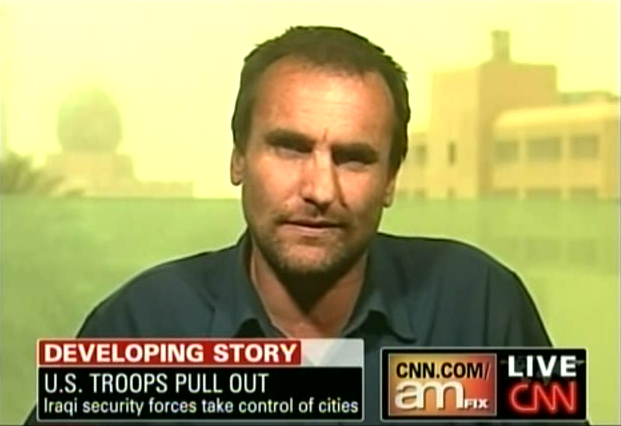AAM: "The Iraqis have the whip hand and the Americans have to take the backseat."
Tuesday, June 30, 2009

Length: 3:05
LARGE (35.7 MB) ----- SMALL (3.8 MB)
Michael mixes some metaphors to convey the monumental change in tactics from here on out. (You can't blame the Iraqis for wanting to be in charge of their country, but this has got to rankle the take-charge types in the US military.)
KIRAN CHETRY: In Iraq, today was marked with celebrations and fireworks as U.S. forces turned over control of Iraq cities and towns to the country's security forces. Iraq's naming today a national holiday, Sovereignty Day. U.S. troops have been slowly moving out for several months. Most were actually gone before this past weekend.
Our Michael Ware is tracking things live in Baghdad this weekend. And, you know, when we say gone, I mean, they've pulled back, you know, to the Forward Operating Bases. But they're still very much in that country to the tune of more than 130,000.
So what really besides being an occasion that's being marked today formally does this mean?
MICHAEL WARE, CNN INTERNATIONAL CORRESPONDENT: Well, actually, it does mean a lot, Kiran. I mean, we can't neglect the symbolic importance. And from there has come the outpouring of jubilation from Iraqis. As I've been hearing time and time again in the last few days, "Iraq for Iraqis."
I mean, you can't devalue that. There's a strong sense of nationalism here that, well intended or not, the celebrating people here feel that a foreign occupation has finally come to an end.
Now, what it also means, and this is the most pivotal part is that I'm standing here in Iraq where I've been since the invasion began, you know, the invasion in March 2003, and for the first time, today, this is not a U.S.-led war.
The American phase of the war, the American command of the war is over. This is now Iraq's war. Now that means a lot for the Iraqi people and their government. It's up to them now to try and stem the flow of almost ceaseless attacks and also to keep the warring factions apart and return to the blood bath of civil war.
It also means that this 130,000 body of U.S. combat troops now take a supporting role. General Odierno, who is the American commander here on the ground, is no longer running the military show. He's been doing it in partnership up until now. Now, he is here at the behest of the Iraqi government. U.S. troops cannot operate in the main combat areas or what have been the main combat areas, which is the cities and the towns, without having to go and ask for permission from the Iraqi governments, or accepting an invitation from the Iraqi government. American forces can't even go out and detain an enemy combatant who they believe are killing American troops today, tomorrow, the next day, without going to the Iraqi government.
So the Iraqis have the whip hand and the Americans have to take the backseat. That's the most important part.
Kiran?
CHETRY: Michael Ware for us in Baghdad this morning, putting it into perspective. Thanks so much.
